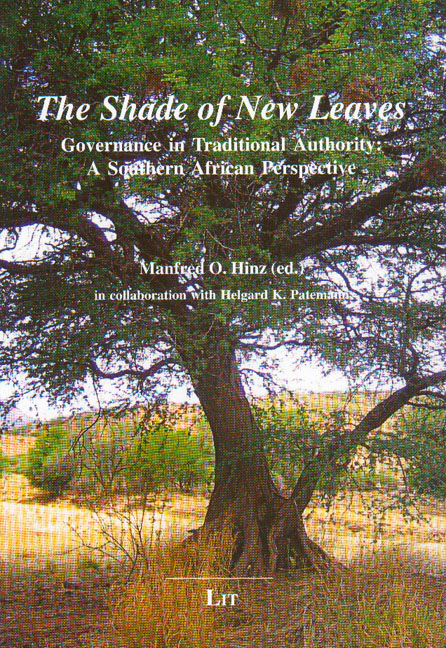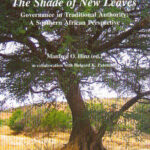Beschreibung
Omudile muua ohapo; epangelo liua ohamba. Freely translated, this proverb
of the Ovakwanyama of northern Namibia means: New leaves produce a good
shade; the laws of a king are always as good as new. The proverb paints a
picture of wisdom to express the dialectical relationship between
continuity and change in customary law. Since royal orders are supposed
not to change from one king to the next, they are always as good as new,
reads the explanatory note to the proverb by the anthropologist Loeb, who
recorded the proverb. Traditional authority is like a tree standing on its
roots, rooted in the tradition created by the ancestors of the ruler and
the community. These roots remain firm, stable and unchanged, not so the
concrete manifestation of authority that changes and responds to changes
of the environment. This makes that new leaves are produced by the rooted
tree. The new leaves are new and old. They are old, because in structure,
colour and their capacity to protect by giving shade, they are more or
less like the leaves of last year and the year before; they are new
because they react to the challenge of seasons.
The Shade of New Leaves emerged out of an international conference on the
living reality of customary law and traditional governance held in
Windhoek in 2004. The conference was organised by the Centre for Applied
Social Sciences and the Human Rights and Documentation Centre, both
affiliated to the Faculty of Law of the University of Namibia, in
co-operation with the Law Departments of the Universities of Bremen,
Germany, and the School of Oriental and African Studies, University of
London.
The contributions to this publication are grouped into six parts:
Part 1: Legal pluralism, traditional governance and the challenge of the
democratic constitutional order; Part 2: Traditional administration of
justice revisited; Part 3: Ascertaining customary law: prerequisite of
good governance in traditional authority; Part 4: Legal philosophy,
African philosophy and African jurisprudence; Part 5: Research, training
and teaching of customary law; and Part 6: Afterthoughts.
Manfred O. Hinz is professor at the University of Bremen and
the University of Namibia, specialising in public law, jurisprudence and
political and legal anthropology. Helgard K. Patemann is researcher in the
Centre for Applied Social Sciences, Faculty of Law, University of Namibia,
specialising in medical anthropology and anthropology of religion.


